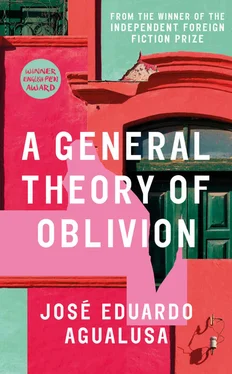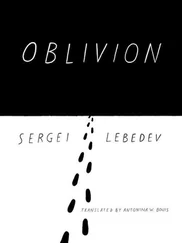He went inside. He saw a desk and two chairs. A rotating fan attached to the ceiling was disturbing the drenched air with slow strokes.
‘Jaime Panguila,’ the sapeur introduced himself, gesturing for him to sit.
Panguila was interested in the stones. First, he examined them by the light of an oil lamp. Then he took them to the window, drew open the curtain, and studied them, turning them around between his fingers under the harsh rays of a sun almost at its peak. Finally, he sat down:
‘These stones, though small, are good, very pure. I don’t want to know how you got hold of them. I’d be risking a lot of trouble by trying to put them on the market. I can’t offer you more than seven thousand dollars.’
He refused. Panguila doubled the offer. He drew a wad of notes from one of the desk drawers, put it into a shoebox and pushed it towards the other man.
Little Chief went to sit in a nearby bar, with the shoebox on top of the table, to think about what he was going to do with the money. He noticed the logo on his beer bottle, the silhouette of a bird with wings spread, and he remembered the pigeon. He had kept the paper in the plastic tube, on which it was still possible to read, albeit with some difficulty:
Tomorrow. Six o’clock, usual place. Be very careful. I love you.
Who might have written that?
Perhaps a senior official at the Diamang mining company. He imagined a man with a severe expression, scribbling out the message, putting the note into the plastic cylinder and then attaching it to the leg of the pigeon. He imagined him putting the diamonds into the bird’s beak, first one and then the other, and then releasing it, and it flying off from a residence that was sunk amid tall, leafy mango trees into Dundo, to the perilous skies of the capital. He imagined it flying above the dark forests, the astonished rivers, the many armies pitted in conflict.
He got up, smiling. He already knew what to do with the money. In the months that followed he devised and established a small delivery service, which he named Pigeon-Post. The Portuguese word for pigeon also meant ‘messenger’ in Kimbundo, and the coincidence pleased him. The company prospered, and new projects came along to join it. He invested in several different areas, from hotels to real estate, always successfully.
One Sunday afternoon, it was December and the air was dazzlingly bright, he met Papy Bolingô at Rialto. They ordered some beers. They chatted without any urgency, slow and chilled, stretching out into the langour of the afternoon as if in a hammock.
‘And life, Papy?’
‘Goes on living.’
‘And what about you, still singing?’
‘Not very much, bro. I haven’t been doing the act. Fofo has been a bit funny lately.’
Papy Bolingô had been sacked from Rádio Nacional. He’d been surviving, with great effort, by playing at parties. One of his cousins, a hunting-party guide, had brought him a pygmy hippo from the Congo. The guide had found the animal in the forest when it was still a baby, desperately watching over its mother’s dead body. The guitar player had brought the animal to his apartment. He fed it from a baby’s bottle. He taught it to dance the Zaire rumba. Fofo, the hippo, started to join him when he performed at small bars on the outskirts of Luanda. Little Chief had seen the show several times, and he’d always come out feeling impressed. The problem was that the hippo had grown too much. Pygmy hippos, or dwarf hippos ( Choeropsis liberiensis ) may look small compared to their better-known relatives, but by the time they are adults they can grow to the volume of a large pig. The protests from the neighbours in the building grew. Many of them owned dogs. Some insisted on raising chickens on their verandas, or goats, occasionally pigs. No one had hippos. A hippopotamus, even if this particular one was an artist, frightened the residents. Some of them, when they saw him out on the veranda, threw stones.
Little Chief saw that the time had come to help his friend.
‘How much do you want for your place? I need a good apartment, right in the heart of the capital. You need a farm, a big open space, to raise the hippo.’
Papy Bolingô hesitated.
‘I’ve been in that apartment so many years now, I think I’ve become attached to it.’
‘Five hundred thousand?’
‘Five hundred thousand? Five hundred thousand what?’
‘I’ll give you five hundred thousand dollars for the apartment. You can buy yourself a nice farm with money like that.’
Papy Bolingô laughed, amused. Then he noticed the seriousness of his friend’s face and his laughter stopped. He straightened up:
‘I thought you were kidding. You’ve got five hundred thousand dollars?’
‘And several million more. Many million. I’m not doing you a favour, I think it’s an excellent investment. Your building is pretty shabby, but with a good coat of paint, and new elevators, it’ll get its old colonial charm back. Before too long, buyers are going to start showing up. Generals. Ministers. People with a lot more money than me. They’ll pay some paltry sums for people to leave. Those who don’t leave nicely will be made to do it nastily.’
That was how Little Chief ended up with Papy Bolingô’s apartment.
I’ve been losing my eyesight. I close my right eye and I can only see shadows now. Everything confuses me. I walk clinging on to the walls. It’s a struggle to read, and I can only do that in sunlight, using stronger and stronger magnifying glasses. I reread my last remaining books, the ones I refuse to burn. I have been burning the beautiful voices that have kept me company over all these years.
I sometimes think: I’ve gone mad.
I saw, from out on the terrace, a hippopotamus dancing on the veranda of the apartment next door. An illusion, I’m quite aware of that, but I did see it just the same. It might be hunger. I’ve been feeding myself very badly.
My weakness, my vanishing eyesight, it means I stumble over letters as I read. I read pages I’ve read so many times before, but they’re different now. I get things wrong, as I read, and in those mistakes, sometimes, I find incredible things that are right.
In these mistakes I find myself, often.
Some pages are improved by these mistakes.
A sparkle of fireflies, fireflying through the rooms. I move about, like a medusa jellyfish, in this illuminated haze. I sink into my own dreams. One might perhaps call this dying.
I was happy in this home, on those afternoons when the sun came into the kitchen to pay me a visit. I would sit down at the table. Phantom would come over and rest his head in my lap.
If I still had the space, the charcoal, and available walls, I could compose a great work about forgetting: a general theory of oblivion.
I realise I have transformed the entire apartment into a huge book. After burning the library, after I have died, all that remains will be my voice.
In this house all the walls have my mouth.
THE COLLECTOR OF DISAPPEARANCES
During the years 1997 and 1998 five airplanes, originating in Belarus, Russia, Moldavia and Ukraine, disappeared from Angola’s skies with a total of twenty-three crew. On 25 May 2003, a Boeing 727 belonging to American Airlines went astray from Luanda airport and was never seen again. The thing hadn’t flown for fourteen months.
Daniel Benchimol collected stories of disappearances in Angola. All kinds of disappearances, though he preferred those of the air. It’s always more interesting being snatched away by the heavens, like Jesus Christ or his mother, than being swallowed up by the earth. People or objects who are literally swallowed by the earth, as seemed to have happened to the French writer Simon-Pierre Mulamba, are, however, very rare.
Читать дальше












